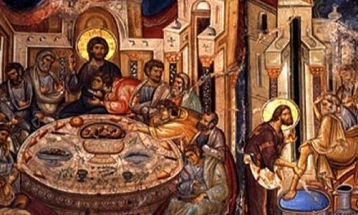
21 July 2024 (MIA)
Macedonian Orthodox Church Calendar
Holy and Great Martyr Procopius
Neanias was born to a Christian father and a pagan mother in Jerusalem. His father died while he was very young and his mother indoctrinated him in Roman idolatry. Diocletian himself recruited him for his army. At the beginning of Diocletian’s persecution of Christians, he was ordered to go to Alexandria to exterminate the Christians there. On the way there, at 3AM, an earthquake awakened him, and the Lord Jesus appeared to him and said, “Neanias, where are you going, and against whom are you rebelling?” Neanias answered, “Who are you, Lord? I cannot recognise You.” Then a bright and shining Cross with the appearance of crystal lit up the sky. A voice from the Cross said, “I am Jesus, the crucified Son of God. By this sign that you have seen, overcome your enemies and My peace will be with you.” So Neanias changed course and successfully defended Jerusalem against the Agarians. He entered the city and told his mother that he was a Christian. At his trial, he cast his sword and military belt before the judge to show that he was a soldier only of Christ the King. He was imprisoned and tortured. Christ Himself appeared to him in prison to baptise him and give him the name Procopius. 12 women came to the window of his cell to confess that they were also servants of Christ. They were thrown into the same prison. Saint Procopius catechised them and prepared them to receive the crown of martyrdom. Procopius’s mother also came to the faith and was arrested. Procopius encouraged each of them to endure to the end to receive the crown. All 13 were martyred for their faith. Finally Procopius was beheaded on July 8, 303, after facing East and offering prayers for the needy and for the Church. Thus he was the coach and “cheerleader” of martyrs. This is why he is invoked in the wedding service to encourage married people to endure to the end to receive the crown.
Catholic Calendar
St. Lawrence of Brindisi
Caesare de Rossi was born at Brandisi, kingdom of Naples, on July 22nd. He was educated by the conventual Franciscans there and by his uncle at St. Mark’s in Venice. When sixteen, he joined the Capuchins at Verona, taking the name Lawrence. He pursued his higher studies in theology, philosophy, the bible, Greek, Hebrew, and several other languages at the University of Padua. He was ordained and began to preach with great effect in Northern Italy. He became definitor general of his Order in Rome in 1596, a position he was to hold five times, was assigned to conversion work with Jews, and was sent to Germany, with Blessed Benedict of Urbino, to combat Lutheranism. They founded friaries at Prague, Vienna, and Gorizia, which were to develop into the provinces of Bohemia, Austria, and Styria. At the request of Emperor Rudolf II, Lawrence helped raise an army among the German rulers to fight against the Turks, who were threatening to conquer all of Hungary, became its chaplain, and was among the leaders in the Battle of Szekesfehevar in 1601; many attributed the ensuing victory to him. In 1602, he was elected Vicar General of the Capuchins but refused re-election in 1605. He was sent to Spain by the emperor to persuade Philip III to join the Catholic League, and while there, founded a Capuchin house in Madrid. He was then sent as papal nuncio to the court of Maximillian of Bavaria, served as peacemaker in several royal disputes, and in 1618, retired from worldly affairs to the friary at Caserta. He was recalled at the request of the rulers of Naples to go to Spain to intercede with King Philip for them against the Duke of Osuna, Spanish envoy to Naples and convinced the King to recall the Duke to avert an uprising. The trip in the sweltering heat of summer exhausted him, and he died a few days after his meeting with the King at Lisbon on July 22nd. Lawrence wrote a commentary on Genesis and several treatises against Luther, but Lawrence’s main writings are in the nine volumes of his sermons. He was canonised in 1881 and proclaimed a Doctor of the Church by Pope John XXIII in 1959.







